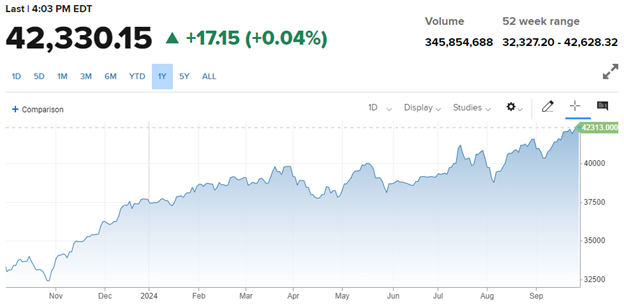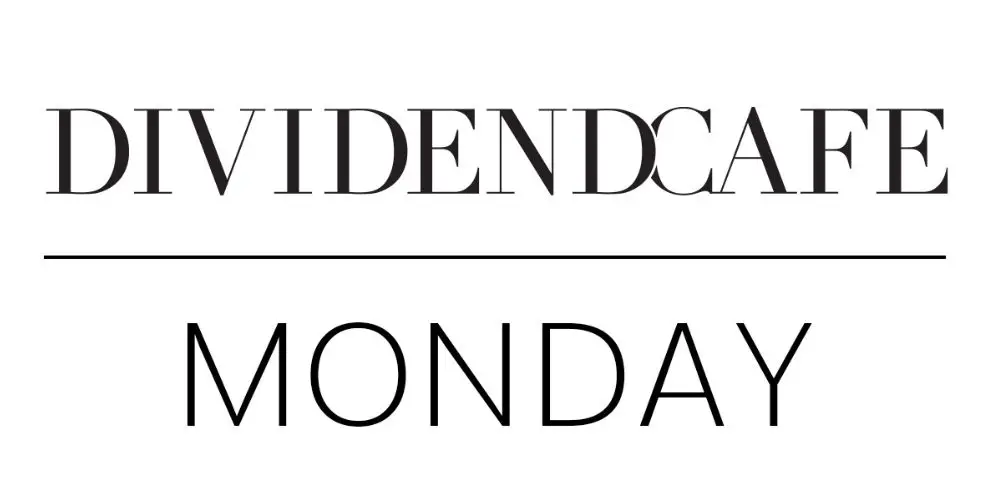Dear Valued Clients and Friends –
Today marks the last day of Q3 and the first day of our annual money manager week here in the city. Kenny and Brian have joined me for what will be over twenty meetings over the next five days with portfolio managers and senior investment talent from the major asset management partners we work with (hedge funds, private equity, real estate, fixed income, private credit, emerging markets, etc.). It is an invigorating week, one that dates back to 2006 when I first had the initiative to pick up the phone and ask for these meetings, and I cannot wait for what will come out of it. We learn a lot. We collaborate a lot. And our Investment Committee grows and develops in our process every year because of this. More to come!
Before we go too much further, the Friday Dividend Cafe was all about the election, ramifications for investors, economic policy, and more. This has become a tradition every four years (I prefer calling it a quadrennial tradition, but then I get emails asking me what that means). I have already received emails from some who are supporting Donald Trump and others who are supporting Kamala Harris, who are upset with what I said or didn’t say, so I take that to mean I accomplished what I wanted. It is my belief that the piece is honest, objective, and suitable for investors trying to assess the lay of the land. If it reflected some of my personal ideology, it’s because I am the one who wrote it. If it did not come off as partisan or politically oriented, it’s because it wasn’t meant to be such. The written version is here (by far my favorite), the video is here, and the podcast is here.
My apologies that there is no podcast or video today. We are deep in meetings at Blackstone throughout the late afternoon and just cannot record.
Off we go…
Market Action
- The market opened down, then rallied back, then sold off again as quarter-end rebalancing trades hit market flows.
- The Dow closed up +17 points (+0.04%), with the S&P 500 up +0.42% and the Nasdaq up +0.38%. Thus, Q3 is over, and the final quarter of 2024 begins tomorrow.

*CNBC, DJIA, Sept. 30, 2024
- Utilities are up +18% this quarter, their best quarter since 2003.
- Chinese equities, lagging all year long (especially their tech and internet sector), all of a sudden are up more than the S&P 500 on the year, rallying +13% in just four days last week and now up nine days in a row. It was the biggest week in the history of the Chinese stock market (FXI)
- We aren’t touching it, but one thing that caught my attention: Well, less than 10% of their public stock market has a return on invested capital of more than 10% over the last five years.
- The ten-year bond yield closed today at 3.80%, up four basis points on the day.
- Top-performing sector for the day: Energy (+0.92%)
- Bottom-performing sector for the day: Materials (-0.54%)
- One of the most common narratives in investing for the last 10-12 years is that “while Europe has cyclical and structural problems, those things appear overly priced in, and as a value play, their P/E multiple is so discounted to the United States, and even the rest of the developed world, that is is a screaming buy” (now, I am not sure if this “common narrative” is always uttered in as bad of a run-on sentence as I just did, but you get the idea). I have heard it since about 2012, and there has been prima facie support for it every year, and it has proven to be wrong basically every year. Goldman Sachs has now come out with a new public report suggesting Europe really will deserve its lower valuation for some time, with structural challenges persisting, and all of a sudden, I wonder if “now is time time” (I kid, I kid).
- Currently, 42% of the Russell 2000 (small cap index) has negative earnings. This remains the most significant equity asset class on the planet besides emerging markets in which active management so thoroughly trumps passive indexing.
Top News Stories
- The biggest news of the weekend was undoubtedly the killing of terrorist Hassan Nasrallah, the head of Hezbollah, in an Israeli strike in Beirut. Israel’s progress against the terror group in recent weeks has been historic.
- Japan’s new Prime Minister is Shigeru Ishiba, who ran on a platform supporting tighter monetary policy and a stronger Yen in the future.
Public Policy
- All eyes are on the longshoreman’s union plans to begin a strike tomorrow and what it may or may not mean to U.S. supply chains. Dockworkers are planning to strike across East Coast and Gulf Coast ports.
- Hot take: I think Pennsylvania’s winner will be the next President (yes, really, really hot take).
Economic Front
- Year-over-year headline PCE inflation is now +2.2%. Headline is lower than Core because food prices were only up 0.1% on the month and energy fell -0.8%.
- Prices are dropping. Wage growth is good. Jobs are plentiful. So why is the savings rate now the lowest it has been since 2013 (besides COVID)?
- No economic data point was more significant last week than China’s slumping factory activity. Demand is deteriorating and their activity not only under-performed expectations but went negative on the month!
Housing & Mortgage
- Median rent for new apartments dropped by 6.2% in Q2 per Redfin, as too much supply is still meeting pretty solid demand. All the new construction comes in concert with prices at sky-high levels, leaving lower prices as the likely solution to a competitive landscape that is well-supplied and expensive.
Federal Reserve
- The odds are now 64% for the Fed’s rate cut in November will be a quarter-point. It gets more complicated in December because of the optionality of what happens in November. The best way to say this: There is a 15% chance in the futures market that we will end the year 1% lower than we are now (i.e., two more half-point cuts); there is a 50% chance in the futures market that we end the year 0.75% lower than we are now (i.e., one rate cut of a quarter-point and one of a half-point); there is a 37% chance in the futures market that we end the year 0.50% lower than we are now (i.e. two more quarter-point cuts)
- The odds all moved towards fewer cuts than more this morning after Powell’s speech at NABE.
- Torsten Slok (Apollo’s Chief Economist) persistently beats the drum that financial conditions matter more than the fed funds rate. Companies and households do not borrow at the fed funds rate, so while it serves as the vital reference rate in the economy when conditions are tight vs. when they are loose, it speaks to impact on real-life conditions far more. The Fed was getting an extra lift from very tight financial conditions a year ago, meaning things were even tighter than their Fed funds rate indicated. The reverse is true now – spreads are narrow, stocks are up, GDP estimates are up – and financial conditions are healthy even as real rates are dropping.
Oil and Energy
- WTI Crude closed at $68.23, up +0.07% on the day.
- Reports have hit in recent days that “Saudi Arabia is abandoning its $100 price goal for oil,” and I suppose the big news there was that Saudi had a price goal for oil of $100. It is hard to see how they abandoned something that they haven’t worked for or seen in two years, but nevertheless, some seemed to take these reports as a sign that Saudi was about to ramp up production. Well, prices have been in the low 70s for quite some time ($68 after these reports), so the delta involved in this reporting strikes me as a tad incoherent.
- What has held oil prices down? Let me answer, first, with what has not pushed oil higher … Israel/Hezbollah/Hamas/Gaza/Iran drama. Not even a little bit. Oil markets either do not believe that it is going to escalate militarily, or they do not believe (yet) that such an escalation is going to put downward pressure on oil prices. But beyond that, I think the largest global factor in holding oil between $68 and $75 is China’s economic weakness. Their slowdown has pressured the demand side, even as OPEC+ has tried to use the supply side to hold prices higher.
- When these OPEC/Saudi stories hit the news last week midstream saw some volatility, but ended up only down -0.5% on the week, with oil down over -5% and energy stocks, at large, down -3%. This relative outperformance of midstream and resilient non-correlation to commodity prices and upstream energy has been one of the most persistent themes of 2024, thus far.
Against Doomsdayism
- Many very wise and astute people consistently point out the dangers and excesses modern technology represents, primarily focused around teen phone addiction, the social ugliness of social media, and various crowding out of healthy human activity that has resulted from increased screen time. I am 100% on board with all of those criticisms, desperately wish people would put their feet on the grass more, have worked with my board to take phones out of the high school we started in Southern California, and never, ever, ever read comments or replies in the cesspool of social media. That said, excesses and abuses are a part of the fallen world, and the positives of digital technology advancements warrant consideration, too. Think about the needed connectivity presented during the COVID moment (and I don’t just mean the ability to stream The Last Dance, but I don’t not mean that, either). Think of GPS and map technology and how direction-challenged people can be told exactly where to go, any time, and even where to pick up a Starbucks on the way. From search to cloud to food delivery, we have had 2,500 years of civilizational advancement in 10-15 years, and there are huge cultural and social challenges that have come with this. But it is not honest to act like the entire advancement has been negative. We get to chime in on the negatives only because we first take the positives for granted!
Ask TBG
| “I think I understand what constitutes a hard vs. soft economic landing, but I don’t understand the time for declaring a hard or soft landing. Is it a date certain? Is it an agreed-upon range of time? And who decides when either a hard or soft landing can be declared? Thanks!” ~ Gus B. |
| It is not so formal or objective. Like Judge Potter’s famous quip about something else, people “know it when they see it.”
But it is generally some consensus around economic conditions as pertains to unemployment, wages, and profits, and the GDP growth (or contraction) that would accompany such measures. The timeline would be adjacent to the period in question enough so as to be reasonable (i.e., a recession in 2027 following the credit tightening of 2022 would not be considered a hard landing; it would be a separate event). So, if what we are talking about is the landing that followed this period of Fed tightening, a year or so seems within the Milton Friedman concept of “lags”… |
On Deck
- The monthly jobs report will come out this Friday, the 4th.
Reach out with questions, as always.
With regards,
David L. Bahnsen
Chief Investment Officer, Managing Partner
The Bahnsen Group
www.thebahnsengroup.com
The Dividend Cafe features research from S&P, Baird, Barclays, Goldman Sachs, and the IRN research platform of FactSet.



